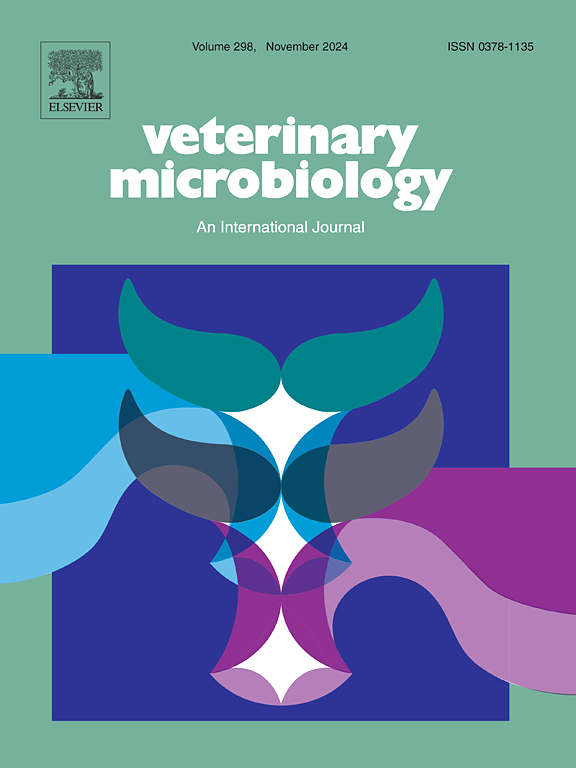Transcription elongation factors GreA and GreB regulate the cellular invasion and virulence of Salmonella Enteritidis
IF 2.7
2区 农林科学
Q3 MICROBIOLOGY
引用次数: 0
Abstract
The facultative intracellular bacterium Salmonella enterica subspecies enterica serotype Enteritidis (S. Enteritidis) is a leading cause of salmonellosis in humans and animals and has been associated with intensive poultry farming and egg production. Gre proteins (including GreA and GreB) have been identified as virulence factors in several bacteria, but their role in S. Enteritidis has not been elucidated. Here, we constructed greA and greB double gene-deletion mutants and investigated their effects on S. Enteritidis. The deletion of the Gre proteins impaired bacterial growth and motility, but enhanced the anti-oxidative stress response and biofilm formation. Thereafter, we evaluated the effects of Gre protein deletion on bacterial adhesion and invasion in vitro and in vivo. Compared to the parental strain, the ΔgreAΔgreB mutant showed significantly increased LD50 values in challenged chicks. The mutant was significantly less efficient at the colonization of livers, spleens, and lungs following subcutaneous inoculation. Consistently, interference with bacterial adhesion and entry into cells was the predominant reason for weakened S. Enteritidis infectivity. Importantly, Gre factors could restore infectivity in the complemented strain. Transcriptomic analysis (RNA-Seq) showed that the loss of Gre proteins caused the differential expression of metabolism and virulence genes. Thus, our fingdings suggest that Gre factors act as transcriptional regulatory factors by influencing the transcription of metabolism-related genes, and can act as virulence elements by directly engaging with cellular invasion and/or indirectly affecting the expression of virulence genes in S. Enteritidis.
转录延伸因子GreA和GreB调控肠炎沙门氏菌的细胞侵袭和毒力
兼性细胞内细菌肠沙门氏菌亚种肠血清型肠炎(肠炎沙门氏菌)是人类和动物沙门氏菌病的主要原因,并与集约化家禽养殖和蛋类生产有关。Gre蛋白(包括GreA和GreB)已被确定为几种细菌的毒力因子,但它们在肠炎沙门氏菌中的作用尚未阐明。在此,我们构建了greA和greB双基因缺失突变体,并研究了它们对肠炎沙门氏菌的影响。Gre蛋白的缺失损害了细菌的生长和运动,但增强了抗氧化应激反应和生物膜的形成。随后,我们在体外和体内评估了Gre蛋白缺失对细菌粘附和侵袭的影响。与亲本菌株相比,ΔgreAΔgreB突变体在攻毒雏鸡中的LD50值显著提高。皮下接种后,突变体在肝脏、脾脏和肺部的定植效率显著降低。一直以来,干扰细菌粘附和进入细胞是肠炎沙门氏菌传染性减弱的主要原因。重要的是,Gre因子可以恢复补充菌株的感染性。转录组学分析(RNA-Seq)显示,Gre蛋白的缺失导致了代谢和毒力基因的差异表达。因此,我们的研究结果表明,Gre因子通过影响代谢相关基因的转录而发挥转录调控因子的作用,并可以通过直接参与细胞入侵和/或间接影响肠炎链球菌毒力基因的表达而发挥毒力因子的作用。
本文章由计算机程序翻译,如有差异,请以英文原文为准。
求助全文
约1分钟内获得全文
求助全文
来源期刊

Veterinary microbiology
农林科学-兽医学
CiteScore
5.90
自引率
6.10%
发文量
221
审稿时长
52 days
期刊介绍:
Veterinary Microbiology is concerned with microbial (bacterial, fungal, viral) diseases of domesticated vertebrate animals (livestock, companion animals, fur-bearing animals, game, poultry, fish) that supply food, other useful products or companionship. In addition, Microbial diseases of wild animals living in captivity, or as members of the feral fauna will also be considered if the infections are of interest because of their interrelation with humans (zoonoses) and/or domestic animals. Studies of antimicrobial resistance are also included, provided that the results represent a substantial advance in knowledge. Authors are strongly encouraged to read - prior to submission - the Editorials (''Scope or cope'' and ''Scope or cope II'') published previously in the journal. The Editors reserve the right to suggest submission to another journal for those papers which they feel would be more appropriate for consideration by that journal.
Original research papers of high quality and novelty on aspects of control, host response, molecular biology, pathogenesis, prevention, and treatment of microbial diseases of animals are published. Papers dealing primarily with immunology, epidemiology, molecular biology and antiviral or microbial agents will only be considered if they demonstrate a clear impact on a disease. Papers focusing solely on diagnostic techniques (such as another PCR protocol or ELISA) will not be published - focus should be on a microorganism and not on a particular technique. Papers only reporting microbial sequences, transcriptomics data, or proteomics data will not be considered unless the results represent a substantial advance in knowledge.
Drug trial papers will be considered if they have general application or significance. Papers on the identification of microorganisms will also be considered, but detailed taxonomic studies do not fall within the scope of the journal. Case reports will not be published, unless they have general application or contain novel aspects. Papers of geographically limited interest, which repeat what had been established elsewhere will not be considered. The readership of the journal is global.
 求助内容:
求助内容: 应助结果提醒方式:
应助结果提醒方式:


